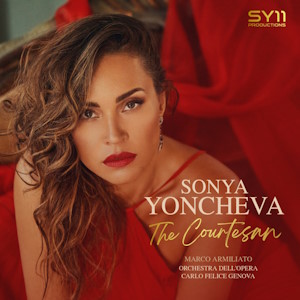
Sonya Yoncheva (soprano)
The Courtesan
Charles Castronovo (tenor)
L’Orchestra dell’Opera Carlo Felice Genova/Marco Armiliato
rec. 2021, Opera Carlo Felice, Genova, Italy
SY11 Productions [57]
The Courtesan is Bulgarian soprano Sonya Yoncheva’s fifth solo release, the first on her own label ‘SY11 Productions’. Released in 2023, it has not previously been reviewed on MusicWeb International. Although I’ve only recently come across this album, it has become almost a fixture on my CD player and certainly deserves a review.
The title concerns Yoncheva’s curiosity about the ‘mysterious world of the courtesans’, some of whom have become well-known names, such as Violetta Valéry, based on Parisian society courtesan Marie Duplessis and Ciò-Ciò-San in Puccini’s Madama Butterfly, the epitome of the Japanese Geisha.
The collection contains twelve opera arias by seven composers spanning some fifty years and many of them could be considered to be verismo, the post-Romantic, Italian opera tradition portraying the realism of gritty everyday life scenes, warts and all, as exemplified by Cavalleria rusticana and Pagliacci. Here, Yoncheva brings together ten leading female roles, many of which she has sung, although a few roles are not in her repertoire, namely Mimì from La bohème (Leoncavallo); Dalila from Samson et Dalila (Saint-Saëns) and the title roles in Manon and Thaïs (Massenet).
Yoncheva is now in her prime, and gives enjoyable, spirited performances. She has a large, rich and attractive voice, but inevitably her ability to produce intense, strong drama often comes at the expense of some unevenness, especially in the heavier arias when her vibrato becomes more prominent -although it never intrudes on my enjoyment and can even increase the expressive effect. She has the capacity to characterise strongly, creating a range of challenging emotional states. Four arias/duos are in French, all impressively sung, yet, it is the three Italian arias that make a distinct impression on me.
Siberia is a rarely heard. Set in the Russian Empire, it is a bleak story mainly involving prison camps and the suffering of inmates. As the heroine Stephana, mistress to Prince Alexis, Yoncheva sounds convincingly like a young woman and sings with great sincerity. She revels in Stephana’s entrance aria Nel suo amore rianimata, conveying both heartfelt passion and the fear that her lover Vassili will discover she was a courtesan in St. Petersburg.
I consider Puccini’s much-loved Madama Butterfly to be a verismo opera. Yoncheva stands out in the famous aria Un bel dì, vedremo as the fifteen-year-old Ciò-Ciò-San, revealing the splendour of her top range, and providing a spellbinding conclusion to the aria that sends a chill down the spine.
Undoubtedly Puccini’s tragic opera Manon Lescaut, too, contains verismo elements. Courtesan Manon has been deported to the United States and been followed by her lover des Grieux. In the aria Sola, perduta, abbandonata, Manon is lying alone, exhausted and dying, reflecting on her past life. Yoncheva produces a performance remarkable for its spine-tingling level of passion and drama.
The Latin verse of In trutina from Carl Orff’s scenic cantata Carmina Burana is described as a bonus track. Yoncheva excels in this beautiful song as a lovestruck woman stuck in the dilemma of choosing between chastity and physical love.
Tenor Charles Castronovo accompanies Yoncheva in the duets from Thaïs and La traviata andtheir voices complement each other very well. L’Orchestra dell’Opera Carlo Felice responds to Marco Armiliato’s conducting with glowing sound and colours. Recorded at the Opera Carlo Felice in Genoa, the sound quality is first class, establishing a satisfying balance between soprano soloist and orchestra. The CD booklet contains an essay and full sung texts with English translations.
As a great admirer of Yoncheva’s voice, I would like to see her record arias from other roles she has sung: Élisabeth from Verdi’s Don Carlos and from Giordano roles, arias by Maddalena from Andrea Chénier and the title role in Fedora. It is also certainly time that collectors had a new recording of Leoncavallo’s La bohème, an opera containing several splendid arias including Mimì’s Musette svaria sulla bocca viva that Yoncheva sings so adeptly here.
Michael Cookson
Availability: SY11 Events
Contents
Jules Massenet
1. Thaïs, in French – duo, act 1, C’est Thaïs (Thaïs & Nicias)
(tenor: Charles Castronovo)
Ruggero Leoncavallo
2. La bohème, in Italian – act 1, Musette svaria sulla bocca viva (Mimì)
Jules Massenet
3. Manon, in French – act 2, Allons il le faut… Adieu, notre petite table (Manon)
Umberto Giordano
4. Siberia, in Italian – act 1, Nel suo amore rianimata (Stephana)
Giacomo Puccini
5. Madama Butterfly, in Italian – act 2, Un bel dì vedremo (Ciò-Ciò-San, aka Madama Butterfly)
Pietro Mascagni
6. Iris, in Italian – act 1, Ho fatto un triste sogno pauroso (Iris)
Jules Massenet
7. Thaïs, in French – act 2, Ah, je suis… Dis-moi que je suis belle (Thaïs)
Giacomo Puccini
8. Manon Lescaut, in Italian – act 2, In quelle trine morbide (Manon)
Giacomo Puccini
9. La bohème, in Italian – act 1, Sì, mi chiamano Mimì (Mimì)
Camille Saint-Saëns
10. Samson et Dalila, in French – act 2, Mon cœur s’ouvre à ta voix (Delila)
Giacomo Puccini
11. Manon Lescaut, in Italian – act 4, Sola, perduta, abbandonata (Manon)
Giuseppe Verdi
12. La traviata, in Italian – duo, act 3, Parigi, o cara (Violetta & Alfredo)
(tenor: Charles Castronovo)
Bonus track:
Carl Orff
13. Cantata, Carmina Burana – In trutina mentis dubia


















